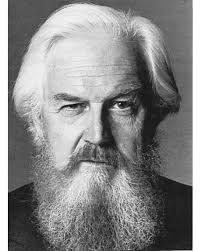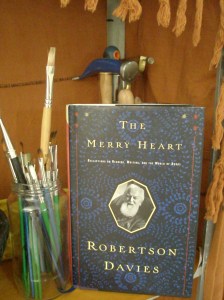This book was published after the death of the author, Robertson Davis. It consists of a selection of speeches, pieces of his diary record, articles, etc.
In some of his speeches he replays time and time again the same ideas. He mentions the same authors or anecdote a lot, but it was good for me to read more than once about these things because it gave me a better idea of the man behind the book.
His speeches were those of a man close to his audience, not a man considering himself to be above others.
Curiously, the pieces of his diary in part look like telegrams. As if he would like to write a few ideas to help him remember a particular event, but without worrying about the particulars of it.
Generally speaking, this a book that can please his readers because it shows how he felt, how he wrote, what he thought about different matters, mostly related to books and literature.
Robertson Davis was an actor, a journalist, a professor and a writer in different stages of his life, but he always was a reader, and his thoughts are those that a lot of readers share.
“A book is renewed every time it finds a perceptive reader, and no book is the same to every reader.”
About the paintings in his home:
“It is living in a place where everything on the walls has something important to say.”
I am not a lover of poetry, not even a reader of poetry. Poetry is almost an accident in my life. Sometimes I discover some poem that finally expresses something real to me, but most often I discover these poems by accident, as in this case thanks to Robertson Davis and his reference to Henrik Ibsen.
To live – is a battle with troll-folk
In the realms of heart and head:
…
Robertson Davis spoke about this poem in a speech given at the Ontario Science Centre in Toronto. The title was Literature and Technology. The whole speeches worth a slow and careful reading, but the part in which he speaks about those troll-folk, expresses an honest reflection on what lies in our heads and our hearts.
Speaking about the future of books, bookshops and readers being in deep decline, the author made a reflection that has a great part of truth.
“I wonder very often how they square their conviction that nobody reads with the evidence of bookshops everywhere and the proliferation of paperback books, which, if not cheap, are at least cheaper than the hardback originals. Most people must be reading, or so many books would not be published every year, and it is possible today to be a very well-read without ever buying a book in hard covers. The literary community, too, seems to be growing at an astounding pace. Wonderful young new writers are hailed every week by eager reviewers. You can hardly throw a stone in the street without hitting somebody who has written a book….”
A healthy and logical piece of advice:
“And you must read a lot of rubbish before you die, as well, because an exclusive diet of masterpieces will give you spiritual dyspepsia. If you want to know what a masterpiece is, read current books, and if you have any taste – which, of course, may not be the case – you will quickly find out.”
I subscribe to his opinion completely about long descriptions of scenarios in books.
“I don´t need to read about his moors and his mountains – I’ve seen them, and all I need is to be told that something is happening on a moor and a mountain to conjure up in an instant what may take him three or four pages of heavy, and to me confusing, prose to describe.”
Robertson Davies, in full William Robertson Davies (born Aug . 28, 1913, Thamesville, Ont., Can.—died Dec. 2, 1995, Orangeville, Ont.), novelist and playwright whose works offer penetrating observations on Canadian provincialism and prudery.
. 28, 1913, Thamesville, Ont., Can.—died Dec. 2, 1995, Orangeville, Ont.), novelist and playwright whose works offer penetrating observations on Canadian provincialism and prudery.
Educated in England at the University of Oxford, Davies had training in acting, directing, and stage management as a member of the Old Vic Repertory Company. He edited the Peterborough Examiner (1942–63), a newspaper owned by his family and taught English at the University of Toronto (1960–81; emeritus thereafter).
Davies’ early reputation was based on the plays Eros at Breakfast (1949) and At My Heart’s Core (1950), which are satires on Canadian standards and values. He also published collections of humorous essays, such as The Diary of Samuel Marchbanks (1947); The Table Talk of Samuel Marchbanks (1949), in which an irascible old bachelor’s opinions highlight the problems of sustaining culture in Canada; and Samuel Marchbanks’ Almanack(1967). Davies’ three trilogies of novels secured his reputation as Canada’s foremost man of letters. Known as a traditional storyteller, he was a master of imaginative writing and wicked wit. The Salterton Trilogy consists of Tempest-Tost (1951), Leaven of Malice (1954), and A Mixture of Frailties (1958), all of which are comedies of manners set in a provincial Canadian university town. Even better known are the novels of the Deptford trilogy, consisting of Fifth Business (1970), The Manticore (1972), and World of Wonders (1975). These books examine the intersecting lives of three men from the small Canadian town of Deptford and interweave Davies’ moral concerns with bits of arcane lore and his enduring interest in Jungian psychotherapy. The Cornish trilogy consists of The Rebel Angels (1981), What’s Bred in the Bone (1985), and The Lyre of Orpheus (1988); these novels satirize the art world, grand opera, and other aspects of high culture in Canada. Murther & Walking Spirits (1991) was written from the perspective of a dead man. The Cunning Man (1994), set in Toronto, spans the 20th century through the memoirs of a doctor; characters from Davies’ earlier works also appear in this novel. His later non fiction included The Mirror of Nature (1983).
Davies was primarily concerned with the moral conflicts of characters in small Canadian towns. In the course of his narratives he wittily satirized bourgeois provincialism, explored the relation between mysticism and art, and affirmed the possibilities for self-knowledge through Jungian philosophy.
